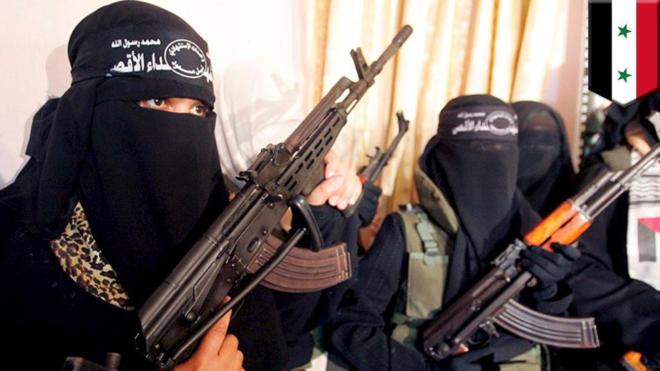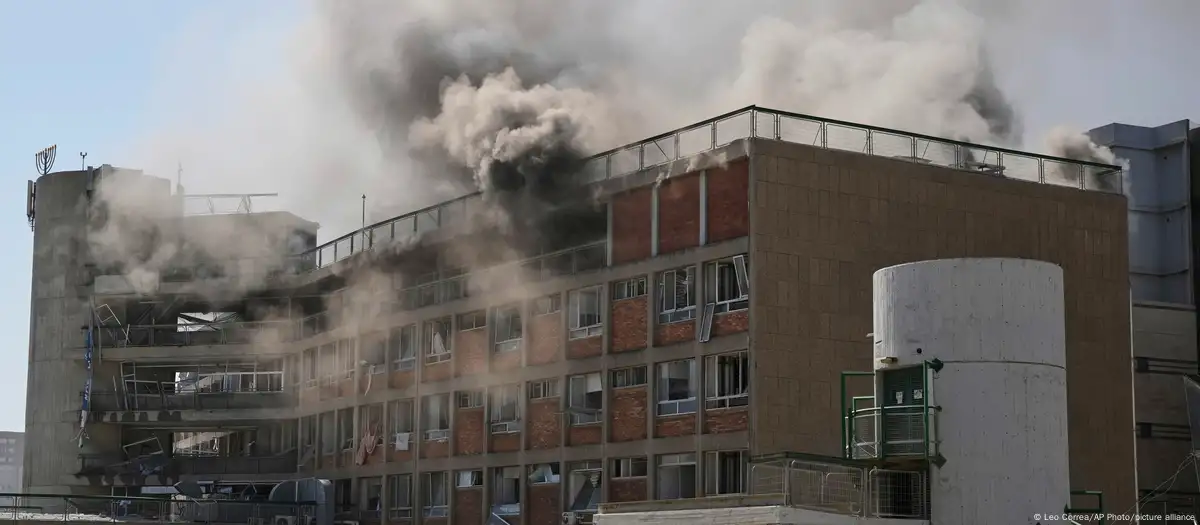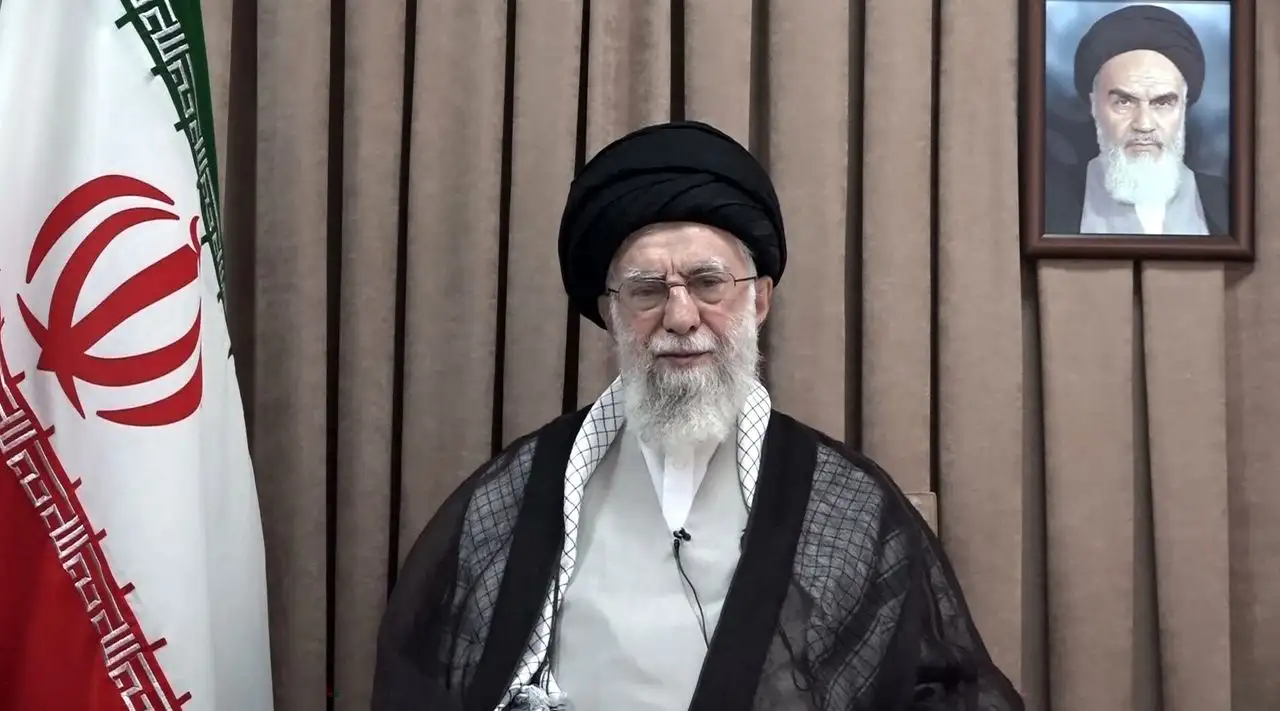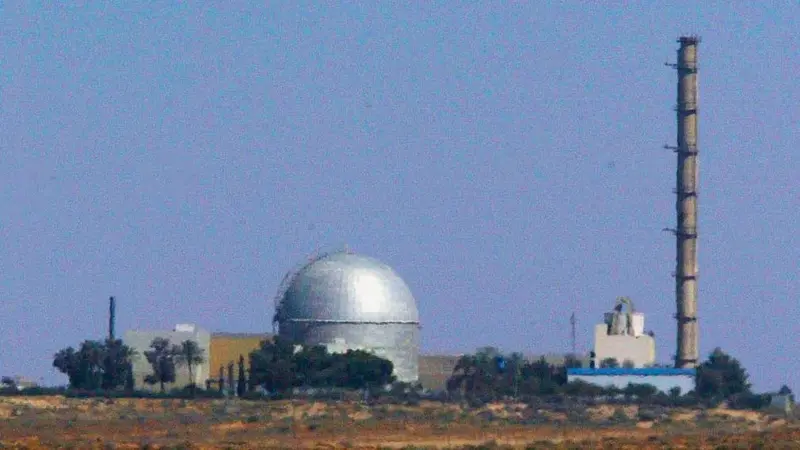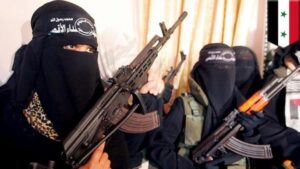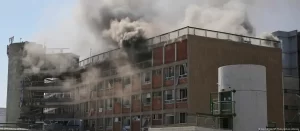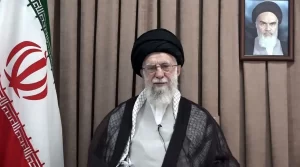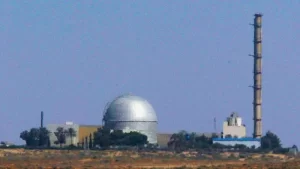Lviv, Moscow and Kyiv (CNN)Even as Russian forces mass on Ukraine‘s border, the spotlight this week has swung back to the rumbling low-intensity war in eastern Ukraine and its possible role in setting the stage for a broader conflict.Over the past three days, there has been an upsurge in shelling along several parts of the front lines. The Ukrainians say shelling by the Russian-backed separatists is at its highest in nearly three years, and for their part the separatists allege the use of heavy weapons by Ukrainian armed forces against civilian areas.On Thursday, a kindergarten in Ukrainian-controlled territory less than 5 kilometers from the front line was hit. On Friday and Saturday, the Ukrainian authorities reported a further spike of shelling by heavy weaponry, which is banned from within 50 kilometers of the front lines by the Minsk Agreements.
Ukrainian authorities say there were 60 breaches of a ceasefire on Thursday, many of them by heavy weapons.
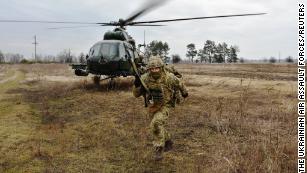
The Ukraine conflict is moving fast. Here’s what to watch forThe leaders of the two breakaway pro-Russian territories — which call themselves the Luhansk and Donetsk People’s Republics — claimed the Ukrainians are planning a large military offensive in the area. On Friday they organized mass evacuations of civilians to Russia, while instructing men to remain and take up arms. Ukrainian officials repeatedly deny any such plans. On Friday, the head of Ukraine’s National Security Council, Oleksiy Danilov, said: «There is a great danger that the representatives of the Russian Federation who are there will provoke certain things. They can do things that have nothing to do with our military.»Danilov did not provide evidence but added: «We can’t say what exactly they are going to do — whether to blow up buses with people who are planned to be evacuated to the Rostov region, or to blow up houses — we don’t know.» Danilov spoke just hours after the mysterious explosion in a vehicle belonging to a senior official in the city of Donetsk, close to the separatists’ headquarters.The region’s leader, Denis Pushilin, called it an act of terrorism. But Ukrainian authorities and western officials said it was a staged provocation — designed perhaps to justify a Russian intervention.After being relatively quiet for much of this year, the «line of contact» has been much more active in the past few days — as the future of Ukraine’s breakaway regions becomes entangled in a much broader range of Russian grievances and demands.
What’s the recent history in Donbas?
War broke out in 2014 after Russian-backed rebels seized government buildings in towns and cities across eastern Ukraine. Intense fighting left portions of the Donbas region’s eastern Luhansk and Donetsk oblasts in the hands of Russian-backed separatists. Russia also annexed Crimea from Ukraine in 2014 in a move that sparked global condemnation.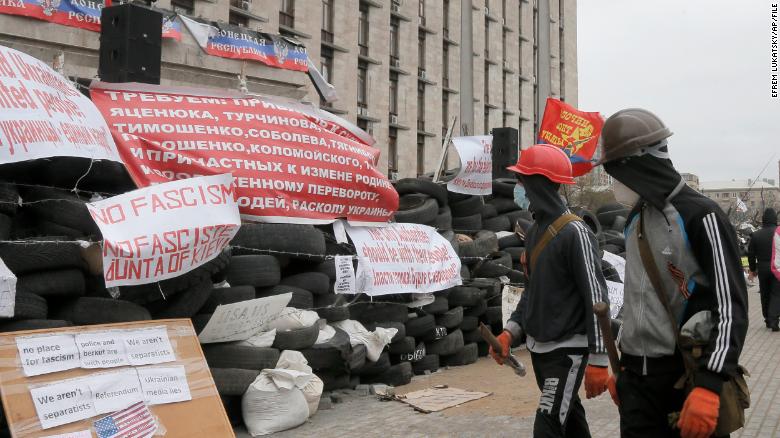 Russian-backed rebels seized a government building in Donetsk, Ukraine on April 11, 2014.The separatist-controlled areas in Donbas became known as the Luhansk People’s Republic (LPR) and the Donetsk People’s Republic (DPR). The Ukrainian government in Kyiv asserts the two regions are in effect Russian-occupied. The self-declared republics are not recognized by any government, including Russia. The Ukrainian government refuses to talk directly with either separatist republic.
Russian-backed rebels seized a government building in Donetsk, Ukraine on April 11, 2014.The separatist-controlled areas in Donbas became known as the Luhansk People’s Republic (LPR) and the Donetsk People’s Republic (DPR). The Ukrainian government in Kyiv asserts the two regions are in effect Russian-occupied. The self-declared republics are not recognized by any government, including Russia. The Ukrainian government refuses to talk directly with either separatist republic.
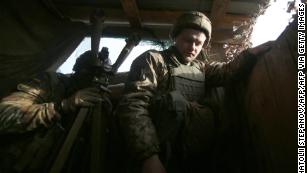
What does Putin want in Ukraine? The conflict explainedThe Minsk II agreement of 2015 led to a shaky ceasefire agreement, and the conflict settled into static warfare along the Line of Contact that separates the Ukrainian government and separatist-controlled areas. The Minsk Agreements (named after the capital of Belarus where they were concluded) ban heavy weapons near the Line of Contact. Language around the conflict is heavily politicized. The Ukrainian government calls separatist forces «invaders» and «occupiers.» Russian media calls separatist forces «militias» and maintains that they are locals defending themselves against the Kyiv government.More than 14,000 people have died in the conflict in Donbas since 2014. Ukraine says 1.5 million people have been forced to flee their homes, with most staying in the areas of Donbas that remain under Ukrainian control and about 200,000 resettling in the wider Kyiv region.
How has Putin stoked the conflict?
The separatists in Donbas have had substantial backing from Moscow. Russia maintains that it has no soldiers on the ground there, but US, NATO and Ukrainian officials say the Russian government supplies the separatists, provides them with advisory support and intelligence, and embeds its own officers in their ranks. Moscow has also distributed hundreds of thousands of Russian passports to people in Donbas in recent years. Western officials and observers have accused Russian President Vladimir Putin of attempting to establish facts on the ground by naturalizing Ukrainians as Russian citizens, a de facto way of recognizing the breakaway states. It also gives him a reason to intervene in Ukraine.And this week, the Russian parliament recommended that the Kremlin formally recognize parts of the LPR and DPR as an independent states, another escalation in rhetoric that US officials say is evidence that Putin has no intention of abiding by the Minsk agreement.
Photos: Ukraine-Russia tensionsUkrainian Interior Minister Denys Monastyrskiy, left, visits soldiers at a front-line position across from Russian-backed separatists in Novoluhanske, Ukraine, on Saturday, February 19. Minutes after he left, the position came under mortar fire. No one was injured.Hide Caption 1 of 29
The evacuation orders were given Friday by pro-Russian separatist leaders in eastern Ukraine’s breakaway regions, who claimed they were necessary because of an imminent offensive by the Ukrainian army. Ukrainian officials have repeatedly denied any such plans and accused the separatists of launching a «disinformation campaign.» The restive eastern part of the country has witnessed the worst shelling in years in recent days, with Ukraine and Russia accusing the other of heavy shelling of civilian areas.Hide Caption 2 of 29
No lives were lost, but it was a stark reminder of the stakes for people living near the front lines that separate Ukrainian government forces from Russian-backed separatists.Hide Caption 11 of 29
Photos: Ukraine-Russia tensionsChildren play on old Soviet tanks in front of the Motherland Monument in Kyiv on Wednesday, February 16.Hide Caption 12 of 29
Photos: Ukraine-Russia tensionsAmbassadors of European countries lay roses at the Wall of Remembrance in Kyiv on February 16. The wall contains the names and photographs of military members who have died since the conflict with Russian-backed separatists began in 2014.Hide Caption 13 of 29
Photos: Ukraine-Russia tensionsUS troops walk on the tarmac at the Rzeszów-Jasionka Airport in southeastern Poland on February 16. US paratroopers landed in Poland as part of a deployment of several thousand sent to bolster NATO’s eastern flank in response to tensions with Russia.Hide Caption 14 of 29
Photos: Ukraine-Russia tensionsA 200-meter-long Ukrainian flag is unfolded at the Olympic Stadium in Kyiv on February 16 to mark a «Day of Unity,» an impromptu celebration declared by President Volodymyr Zelensky.Hide Caption 15 of 29
Photos: Ukraine-Russia tensionsTravelers wait in line to check in to their departing flights Tuesday, February 15, at the Boryspil International Airport outside Kyiv. US President Joe Biden has urged Americans in Ukraine to leave the country, warning that «things could go crazy quickly» in the region.Hide Caption 16 of 29
The websites of Oschadbank and PrivatBank, the country’s two largest banks, were hit by cyberattacks that day, as were the websites of Ukraine’s defense ministry and army, according to Ukrainian government agencies.Hide Caption 18 of 29
Photos: Ukraine-Russia tensionsA woman and child walk underneath a military monument in Senkivka, Ukraine, on Monday, February 14. It’s on the outskirts of the Three Sisters border crossing between Ukraine, Russia and Belarus.Hide Caption 19 of 29
Photos: Ukraine-Russia tensionsF/A-18E and 18F Super Hornets are seen on the flight deck of the USS Harry S. Truman, an American aircraft carrier in the Adriatic Sea on February 14. The Truman was on its way to the Middle East in mid-December, but the Pentagon decided to keep it in Europe as tensions began to escalate.Hide Caption 20 of 29
Photos: Ukraine-Russia tensionsUS soldiers and military vehicles are seen at a military airport in Mielec, Poland, on February 12. The White House approved a plan for the nearly 2,000 US troops in Poland to help Americans who may try to evacuate Ukraine if Russia invades, according to two US officials familiar with the matter.Hide Caption 25 of 29
Photos: Ukraine-Russia tensionsUkrainian service members unpack Javelin anti-tank missiles that were delivered to Kyiv on February 10 as part of a US military support package for Ukraine.Hide Caption 28 of 29
Photos: Ukraine-Russia tensionsUkrainian service members walk on an armored fighting vehicle during a training exercise in eastern Ukraine’s Donetsk region on February 10.Hide Caption 29 of 29
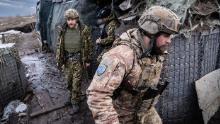
Photos: Ukraine-Russia tensionsUkrainian Interior Minister Denys Monastyrskiy, left, visits soldiers at a front-line position across from Russian-backed separatists in Novoluhanske, Ukraine, on Saturday, February 19. Minutes after he left, the position came under mortar fire. No one was injured.Hide Caption 1 of 29
Photos: Ukraine-Russia tensionsResidents of the breakaway Donetsk state sign up for evacuation to Russia on February 19. The evacuation orders were given Friday by pro-Russian separatist leaders in eastern Ukraine’s breakaway regions, who claimed they were necessary because of an imminent offensive by the Ukrainian army. Ukrainian officials have repeatedly denied any such plans and accused the separatists of launching a «disinformation campaign.» The restive eastern part of the country has witnessed the worst shelling in years in recent days, with Ukraine and Russia accusing the other of heavy shelling of civilian areas.Hide Caption 2 of 29
Photos: Ukraine-Russia tensionsThe remains of a military vehicle are seen in a parking lot outside a government building following an explosion in Donetsk on February 18. Ukrainian and US officials said the vehicle explosion was a staged attack designed to stoke tensions in eastern Ukraine.Hide Caption 9 of 29
Photos: Ukraine-Russia tensionsA memorial service and candlelight vigil is held at the St. Michael’s Golden-Domed Monastery in Kyiv on February 18. They honored those who died in 2014 while protesting against the government of President Viktor Yanukovych, a pro-Russian leader who later fled the country.Hide Caption 10 of 29
Photos: Ukraine-Russia tensionsA kindergarten that officials say was damaged by shelling is seen in Stanytsia Luhanska, Ukraine, on Thursday, February 17. No lives were lost, but it was a stark reminder of the stakes for people living near the front lines that separate Ukrainian government forces from Russian-backed separatists.Hide Caption 11 of 29
Photos: Ukraine-Russia tensionsAmbassadors of European countries lay roses at the Wall of Remembrance in Kyiv on February 16. The wall contains the names and photographs of military members who have died since the conflict with Russian-backed separatists began in 2014.Hide Caption 13 of 29
Photos: Ukraine-Russia tensionsUS troops walk on the tarmac at the Rzeszów-Jasionka Airport in southeastern Poland on February 16. US paratroopers landed in Poland as part of a deployment of several thousand sent to bolster NATO’s eastern flank in response to tensions with Russia.Hide Caption 14 of 29
Photos: Ukraine-Russia tensionsA 200-meter-long Ukrainian flag is unfolded at the Olympic Stadium in Kyiv on February 16 to mark a «Day of Unity,» an impromptu celebration declared by President Volodymyr Zelensky.Hide Caption 15 of 29
Speaking on Wednesday, Ukraine’s Foreign Minister Dmytro Kuleba said Ukraine would «not stop until we free our territories in Donbas, Crimea, until Russia pays for all the damage it caused in Ukraine.»Putin has long accused Ukraine of violating the rights of ethnic Russians and Russian speakers in Ukraine, and has said it was within Russia’s rights to militarily intervene to protect them. On Wednesday, Putin alleged that «genocide» was being committed in Donbas. His allegations aren’t new, but the timing is of concern to Western policy-makers, who fear a repeat of a 2008 conflict in Georgia. By invoking genocide this week, Putin was echoing Russia’s false claim that Georgia committed genocide against civilians in the breakaway republic of South Ossetia in August 2008. During that brief conflict, Russia launched a massive military incursion that pushed deep into Georgian territory.
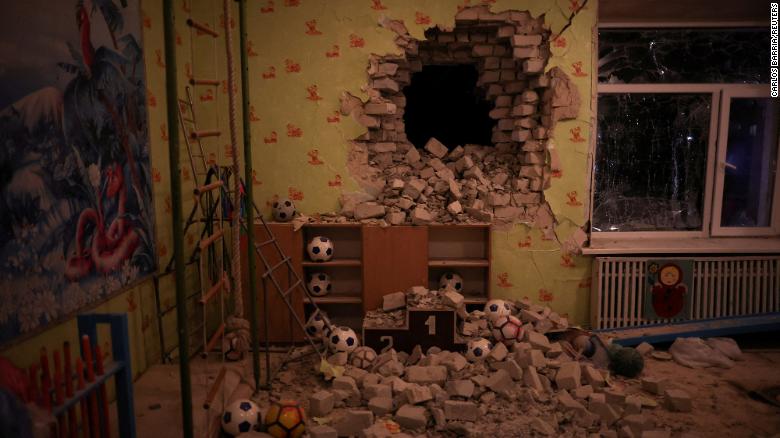
What is happening in Donbas right now?
On Saturday, people from the separatist-controlled regions began heeding the evacuation order, departing in buses across the Russian border. Russian authorities promised them shelter and compensation — while Russian state media covered every aspect and episode of the limited exodus — with the unmistakeable message that people were leaving in their thousands for fear of Ukrainian aggression
As of early Saturday Russian news agencies reported that some 10,000 people had already crossed the border. And Russian authorities say they are ready for up to 900,000 people to arrive, although the separatist leadership has ordered men to remain behind and take up arms and announced a general mobilization.As it was in 2014, the Donbas region is now the crucible of the conflict between east and west, between Putin’s drive to reassert control — weakening the Ukrainian state — and the growing aspiration of Ukrainians to join the fold of European democracies.
CNN’s Tamara Qiblawi wrote from Lviv, Ukraine; Nathan Hodge from Moscow; and Ivana Kottasová from Kyiv, Ukraine. Anastasia Horpinchenko and Kara Fox contributed to this report.
Fuente: CNN, Estados Unidos

